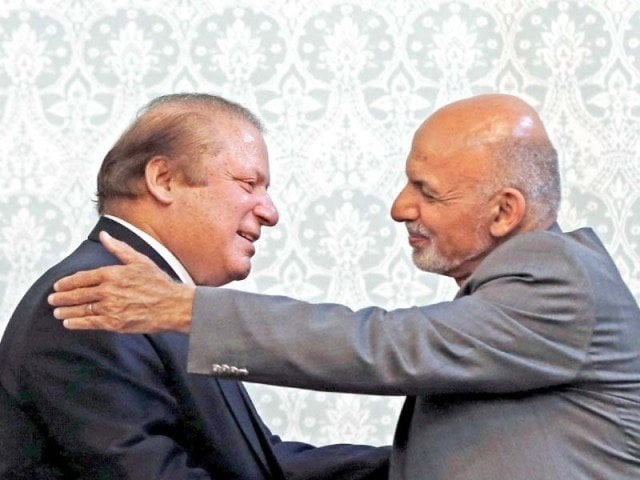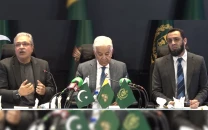Pak-Afghan group calls for closer bilateral ties
Seeks 30% quota in scholarships for Afghan girls

Prime Minister Nawaz Sharif with Aghan President Ashraf Ghani. PHOTO: REUTERS
Welcoming the re-opening of the Pakistan-Afghanistan border, the delegates expressed the hope that “no such actions would be taken in future” to minimise human hardships and trade difficulties on both sides of the border.
Pakistan reopened the border on March 20 after more than a month. The border was closed on February 17 following a series of terrorist attacks that killed over 100 people. The attacks were claimed by banned Pakistani groups operating from the Afghan side of the border.
Pak-Afghan dialogue: Peace activists plead for early reopening of border
The group stressed that insurgency and terrorism were a common challenge and had to be dealt with jointly by both governments.
The meeting was part of ‘Beyond Boundaries II’, a track I.5/II dialogue series undertaken by the Center for Research and Security Studies (CRSS) in partnership with the Afghan counterpart Women Peace and Security Organization (WPSO).
The Islamabad Declaration was issued at the conclusion of the talks which emphasized on people-to-people contacts and removing hardships of the common people visiting both countries.
Recognising the need to develop a joint narrative, emphasizing shared common challenges and solutions, participants welcomed the extension of the refugees’ stay in Pakistan until December 31, 2017 and appreciated recent amendments in the Pakistani visa regime for Afghan nationals.
Pakistan supports Afghan-led peace process: Rabbani
They also called upon the government of Afghanistan to introduce similar changes in the existing visa regime for Pakistani nationals.
Participants include members of parliament, former government officers, members of civil society and media persons from both countries.
They condemned the repeated terrorist attacks in both countries resulting in massive human and material losses.
On bilateral trade relations, the group emphasized the desirability to ensure smooth and friction-free trade and transit between Pakistan and Afghanistan. The group also urged both governments to create an enabling environment.
The group called upon both governments to expedite meetings of the Joint Economic Commission (JEC) and the Afghanistan Pakistan Transit Trade Coordination Authority (APTTCA).
As agreed between the two governments at the sixth APTTCA meeting, the group stressed upon the need for moving forward on the revised draft of the Afghanistan Pakistan Transit Trade Agreement (APTTA) for finalisation.
The participants urged both countries to start talks on the Preferential Trade Agreement (PTA) which had been under discussion for some time.
Calling upon the two governments to finalise the Bilateral Transport Agreement (BTA), the group said that Pakistani vehicles should be allowed to carry merchandise to destinations in Afghanistan and vice versa.
Both sides also recommended the two governments to hold ministerial meetings on bilateral and transit trade matters.
On Pakistani and Afghan prisoners, the group urged both governments to provide consular access and ensure fair and humane treatment to prisoners and detainees in accordance with international norms.
Urging both governments and members of civil society to encourage hosting male and female students for exchange programmes and home stays, particularly between the age groups of 15 and 19, the group also called for awarding additional scholarships for Afghan students, reserving a quota of 30 percent for female applicants.
Delegates also suggested exchange visits of national cricket teams, under-19 cricket, football, taekwondo and other sports teams.
Participants also expressed the resolve to persuade media houses to promote joint media and cultural programs.


















COMMENTS
Comments are moderated and generally will be posted if they are on-topic and not abusive.
For more information, please see our Comments FAQ